Emotional Intelligence in the Workplace
VerifiedAdded on 2020/03/04
|10
|2433
|412
AI Summary
This assignment delves into the concept of Emotional Intelligence (EQ) and its significance within a professional setting. It highlights how emotionally intelligent leaders effectively manage situations, respond to challenges, and foster a positive work environment. The text emphasizes the benefits of EQ for employee motivation, productivity, and teamwork.
Contribute Materials
Your contribution can guide someone’s learning journey. Share your
documents today.
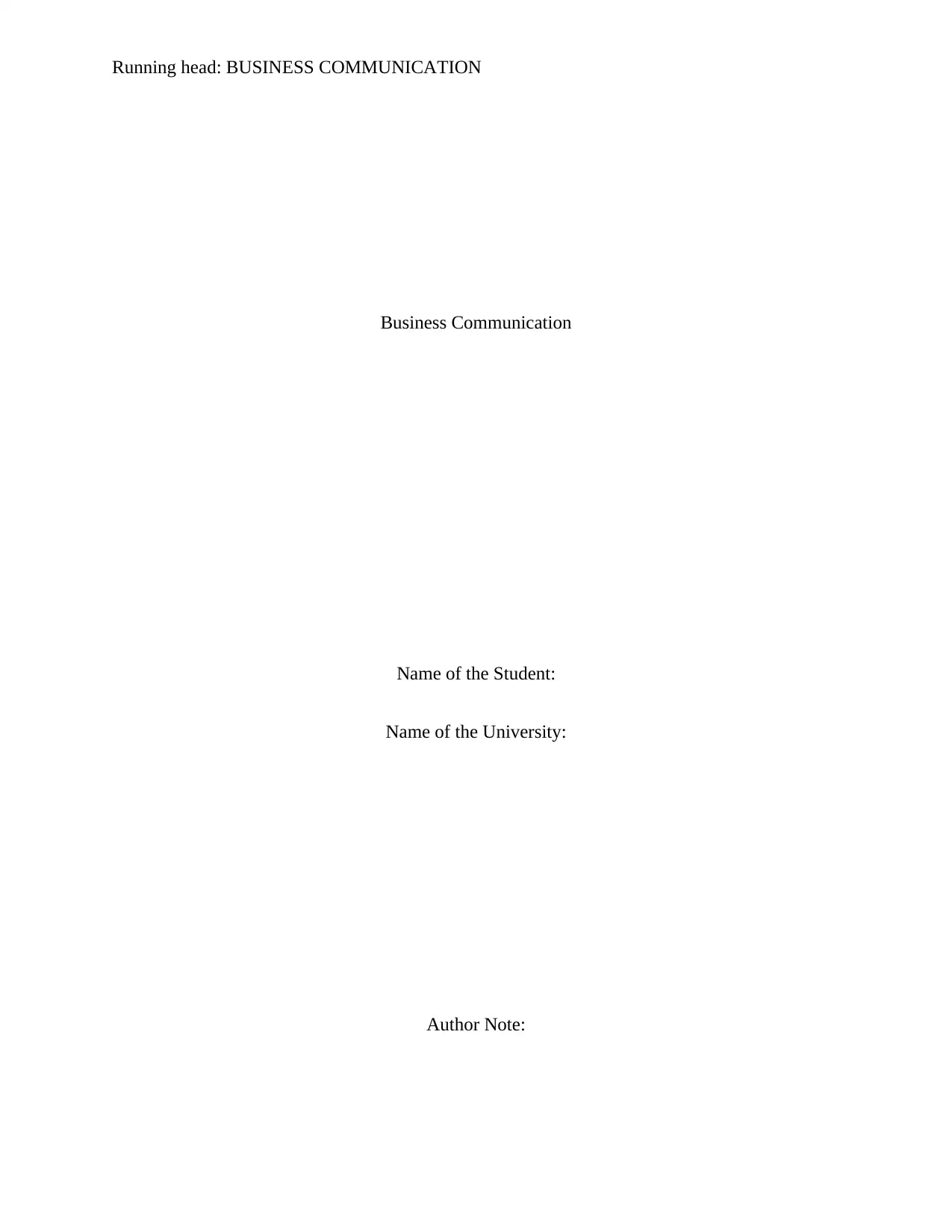
Running head: BUSINESS COMMUNICATION
Business Communication
Name of the Student:
Name of the University:
Author Note:
Business Communication
Name of the Student:
Name of the University:
Author Note:
Secure Best Marks with AI Grader
Need help grading? Try our AI Grader for instant feedback on your assignments.
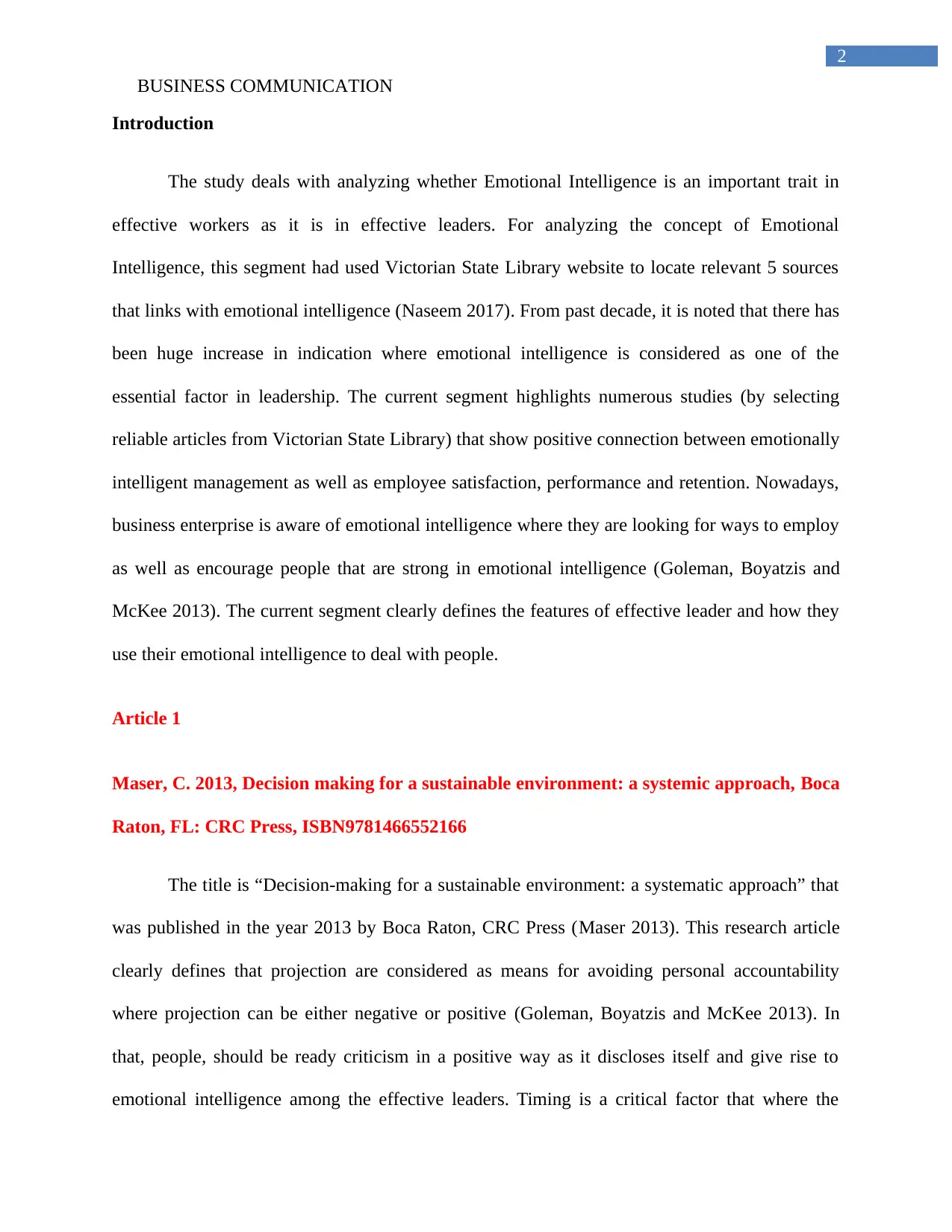
2
BUSINESS COMMUNICATION
Introduction
The study deals with analyzing whether Emotional Intelligence is an important trait in
effective workers as it is in effective leaders. For analyzing the concept of Emotional
Intelligence, this segment had used Victorian State Library website to locate relevant 5 sources
that links with emotional intelligence (Naseem 2017). From past decade, it is noted that there has
been huge increase in indication where emotional intelligence is considered as one of the
essential factor in leadership. The current segment highlights numerous studies (by selecting
reliable articles from Victorian State Library) that show positive connection between emotionally
intelligent management as well as employee satisfaction, performance and retention. Nowadays,
business enterprise is aware of emotional intelligence where they are looking for ways to employ
as well as encourage people that are strong in emotional intelligence (Goleman, Boyatzis and
McKee 2013). The current segment clearly defines the features of effective leader and how they
use their emotional intelligence to deal with people.
Article 1
Maser, C. 2013, Decision making for a sustainable environment: a systemic approach, Boca
Raton, FL: CRC Press, ISBN9781466552166
The title is “Decision-making for a sustainable environment: a systematic approach” that
was published in the year 2013 by Boca Raton, CRC Press (Maser 2013). This research article
clearly defines that projection are considered as means for avoiding personal accountability
where projection can be either negative or positive (Goleman, Boyatzis and McKee 2013). In
that, people, should be ready criticism in a positive way as it discloses itself and give rise to
emotional intelligence among the effective leaders. Timing is a critical factor that where the
BUSINESS COMMUNICATION
Introduction
The study deals with analyzing whether Emotional Intelligence is an important trait in
effective workers as it is in effective leaders. For analyzing the concept of Emotional
Intelligence, this segment had used Victorian State Library website to locate relevant 5 sources
that links with emotional intelligence (Naseem 2017). From past decade, it is noted that there has
been huge increase in indication where emotional intelligence is considered as one of the
essential factor in leadership. The current segment highlights numerous studies (by selecting
reliable articles from Victorian State Library) that show positive connection between emotionally
intelligent management as well as employee satisfaction, performance and retention. Nowadays,
business enterprise is aware of emotional intelligence where they are looking for ways to employ
as well as encourage people that are strong in emotional intelligence (Goleman, Boyatzis and
McKee 2013). The current segment clearly defines the features of effective leader and how they
use their emotional intelligence to deal with people.
Article 1
Maser, C. 2013, Decision making for a sustainable environment: a systemic approach, Boca
Raton, FL: CRC Press, ISBN9781466552166
The title is “Decision-making for a sustainable environment: a systematic approach” that
was published in the year 2013 by Boca Raton, CRC Press (Maser 2013). This research article
clearly defines that projection are considered as means for avoiding personal accountability
where projection can be either negative or positive (Goleman, Boyatzis and McKee 2013). In
that, people, should be ready criticism in a positive way as it discloses itself and give rise to
emotional intelligence among the effective leaders. Timing is a critical factor that where the
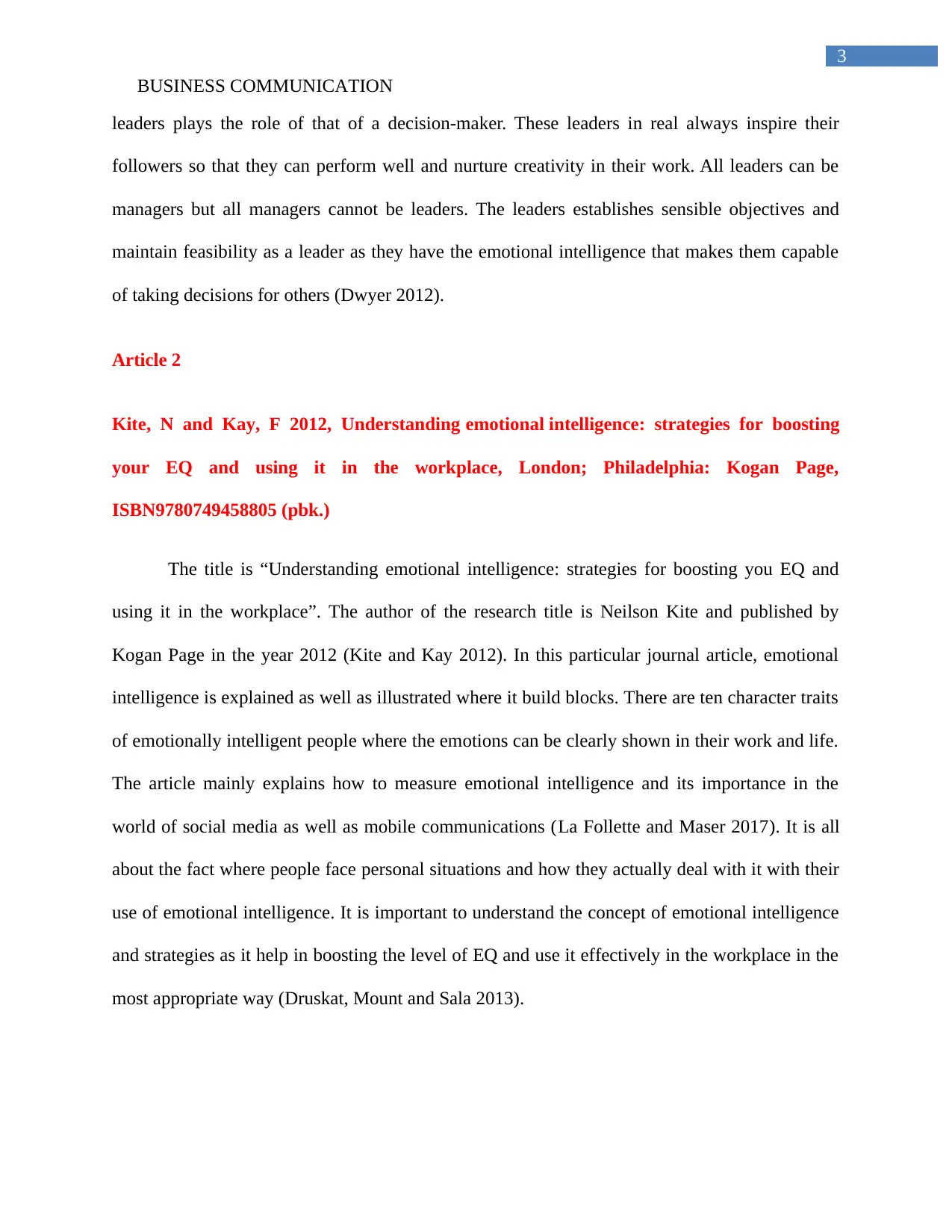
3
BUSINESS COMMUNICATION
leaders plays the role of that of a decision-maker. These leaders in real always inspire their
followers so that they can perform well and nurture creativity in their work. All leaders can be
managers but all managers cannot be leaders. The leaders establishes sensible objectives and
maintain feasibility as a leader as they have the emotional intelligence that makes them capable
of taking decisions for others (Dwyer 2012).
Article 2
Kite, N and Kay, F 2012, Understanding emotional intelligence: strategies for boosting
your EQ and using it in the workplace, London; Philadelphia: Kogan Page,
ISBN9780749458805 (pbk.)
The title is “Understanding emotional intelligence: strategies for boosting you EQ and
using it in the workplace”. The author of the research title is Neilson Kite and published by
Kogan Page in the year 2012 (Kite and Kay 2012). In this particular journal article, emotional
intelligence is explained as well as illustrated where it build blocks. There are ten character traits
of emotionally intelligent people where the emotions can be clearly shown in their work and life.
The article mainly explains how to measure emotional intelligence and its importance in the
world of social media as well as mobile communications (La Follette and Maser 2017). It is all
about the fact where people face personal situations and how they actually deal with it with their
use of emotional intelligence. It is important to understand the concept of emotional intelligence
and strategies as it help in boosting the level of EQ and use it effectively in the workplace in the
most appropriate way (Druskat, Mount and Sala 2013).
BUSINESS COMMUNICATION
leaders plays the role of that of a decision-maker. These leaders in real always inspire their
followers so that they can perform well and nurture creativity in their work. All leaders can be
managers but all managers cannot be leaders. The leaders establishes sensible objectives and
maintain feasibility as a leader as they have the emotional intelligence that makes them capable
of taking decisions for others (Dwyer 2012).
Article 2
Kite, N and Kay, F 2012, Understanding emotional intelligence: strategies for boosting
your EQ and using it in the workplace, London; Philadelphia: Kogan Page,
ISBN9780749458805 (pbk.)
The title is “Understanding emotional intelligence: strategies for boosting you EQ and
using it in the workplace”. The author of the research title is Neilson Kite and published by
Kogan Page in the year 2012 (Kite and Kay 2012). In this particular journal article, emotional
intelligence is explained as well as illustrated where it build blocks. There are ten character traits
of emotionally intelligent people where the emotions can be clearly shown in their work and life.
The article mainly explains how to measure emotional intelligence and its importance in the
world of social media as well as mobile communications (La Follette and Maser 2017). It is all
about the fact where people face personal situations and how they actually deal with it with their
use of emotional intelligence. It is important to understand the concept of emotional intelligence
and strategies as it help in boosting the level of EQ and use it effectively in the workplace in the
most appropriate way (Druskat, Mount and Sala 2013).
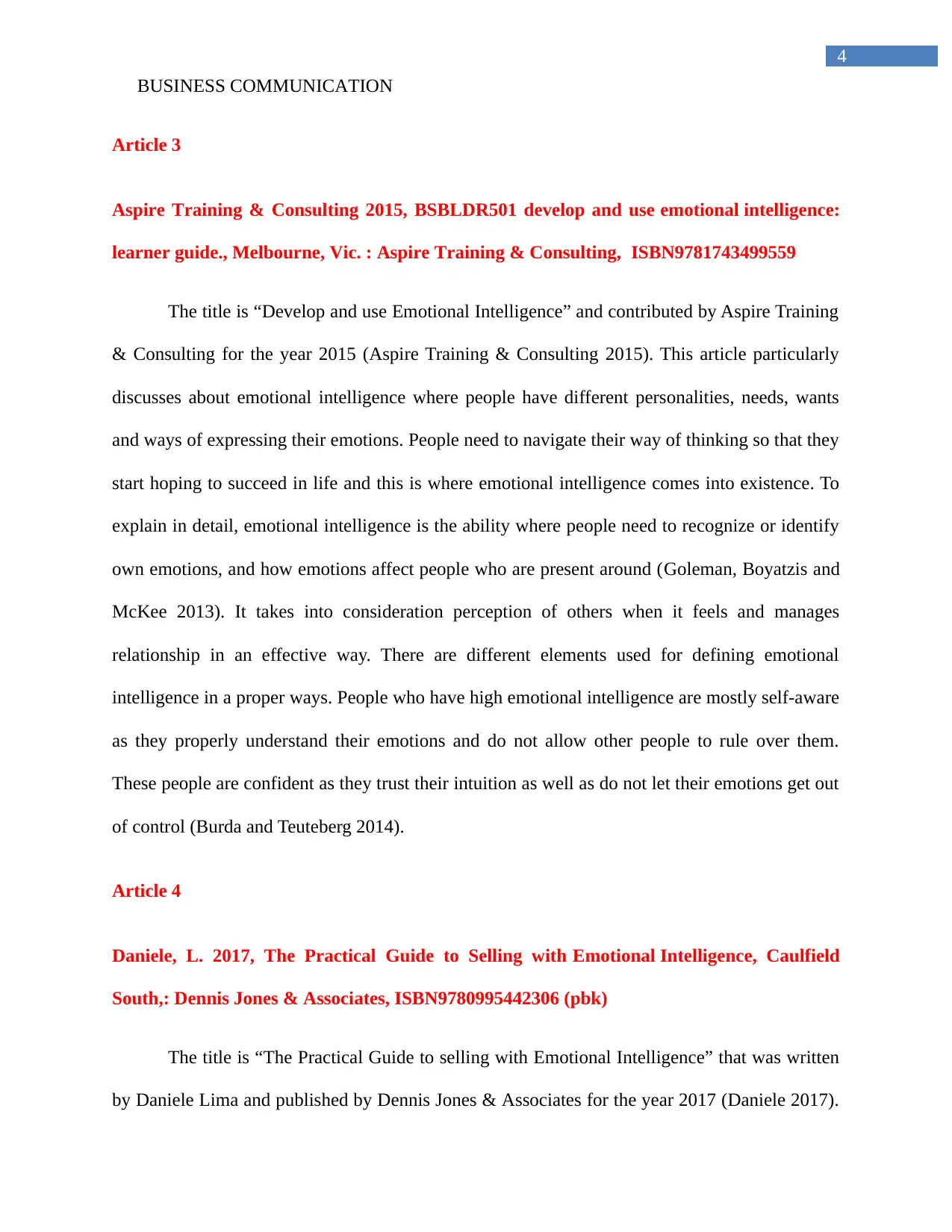
4
BUSINESS COMMUNICATION
Article 3
Aspire Training & Consulting 2015, BSBLDR501 develop and use emotional intelligence:
learner guide., Melbourne, Vic. : Aspire Training & Consulting, ISBN9781743499559
The title is “Develop and use Emotional Intelligence” and contributed by Aspire Training
& Consulting for the year 2015 (Aspire Training & Consulting 2015). This article particularly
discusses about emotional intelligence where people have different personalities, needs, wants
and ways of expressing their emotions. People need to navigate their way of thinking so that they
start hoping to succeed in life and this is where emotional intelligence comes into existence. To
explain in detail, emotional intelligence is the ability where people need to recognize or identify
own emotions, and how emotions affect people who are present around (Goleman, Boyatzis and
McKee 2013). It takes into consideration perception of others when it feels and manages
relationship in an effective way. There are different elements used for defining emotional
intelligence in a proper ways. People who have high emotional intelligence are mostly self-aware
as they properly understand their emotions and do not allow other people to rule over them.
These people are confident as they trust their intuition as well as do not let their emotions get out
of control (Burda and Teuteberg 2014).
Article 4
Daniele, L. 2017, The Practical Guide to Selling with Emotional Intelligence, Caulfield
South,: Dennis Jones & Associates, ISBN9780995442306 (pbk)
The title is “The Practical Guide to selling with Emotional Intelligence” that was written
by Daniele Lima and published by Dennis Jones & Associates for the year 2017 (Daniele 2017).
BUSINESS COMMUNICATION
Article 3
Aspire Training & Consulting 2015, BSBLDR501 develop and use emotional intelligence:
learner guide., Melbourne, Vic. : Aspire Training & Consulting, ISBN9781743499559
The title is “Develop and use Emotional Intelligence” and contributed by Aspire Training
& Consulting for the year 2015 (Aspire Training & Consulting 2015). This article particularly
discusses about emotional intelligence where people have different personalities, needs, wants
and ways of expressing their emotions. People need to navigate their way of thinking so that they
start hoping to succeed in life and this is where emotional intelligence comes into existence. To
explain in detail, emotional intelligence is the ability where people need to recognize or identify
own emotions, and how emotions affect people who are present around (Goleman, Boyatzis and
McKee 2013). It takes into consideration perception of others when it feels and manages
relationship in an effective way. There are different elements used for defining emotional
intelligence in a proper ways. People who have high emotional intelligence are mostly self-aware
as they properly understand their emotions and do not allow other people to rule over them.
These people are confident as they trust their intuition as well as do not let their emotions get out
of control (Burda and Teuteberg 2014).
Article 4
Daniele, L. 2017, The Practical Guide to Selling with Emotional Intelligence, Caulfield
South,: Dennis Jones & Associates, ISBN9780995442306 (pbk)
The title is “The Practical Guide to selling with Emotional Intelligence” that was written
by Daniele Lima and published by Dennis Jones & Associates for the year 2017 (Daniele 2017).
Secure Best Marks with AI Grader
Need help grading? Try our AI Grader for instant feedback on your assignments.
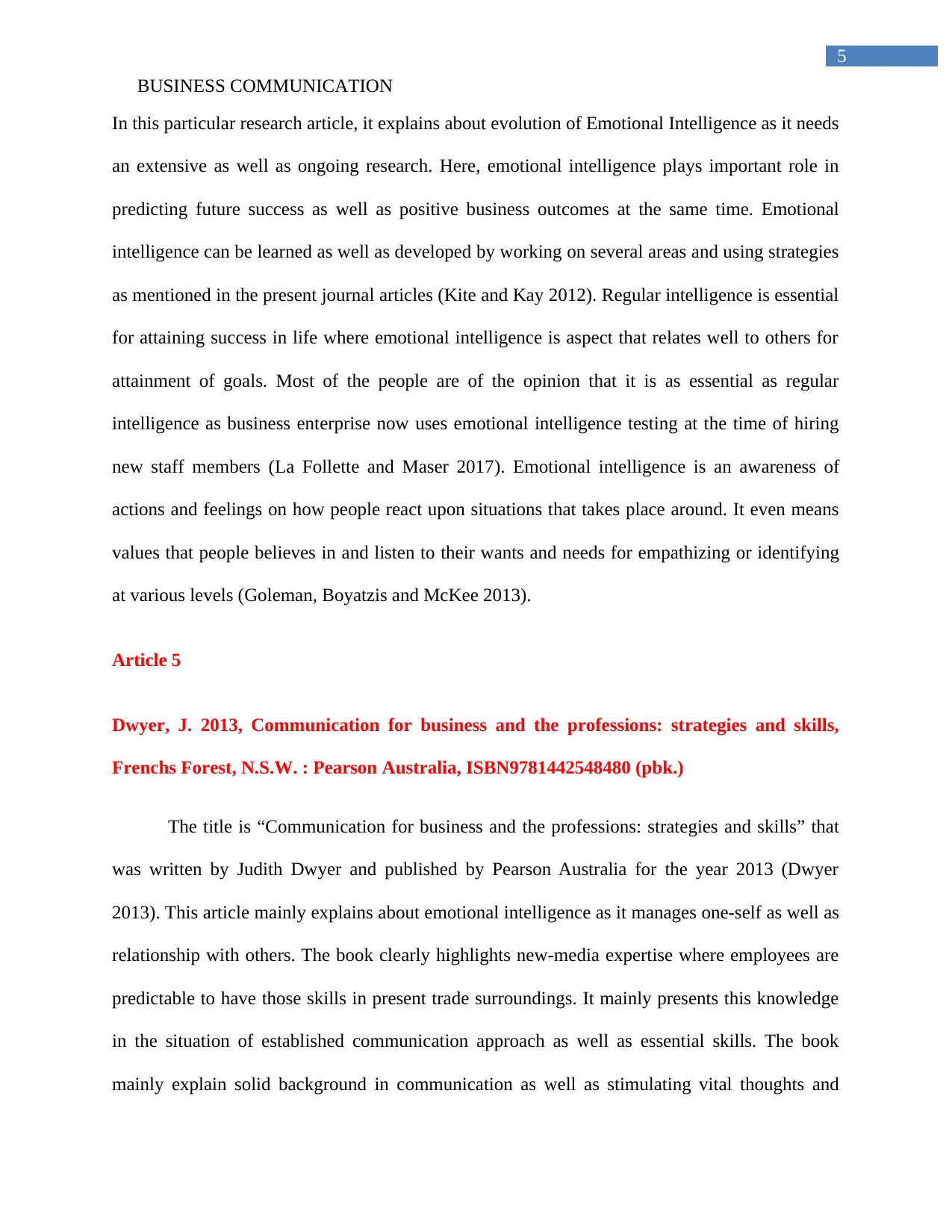
5
BUSINESS COMMUNICATION
In this particular research article, it explains about evolution of Emotional Intelligence as it needs
an extensive as well as ongoing research. Here, emotional intelligence plays important role in
predicting future success as well as positive business outcomes at the same time. Emotional
intelligence can be learned as well as developed by working on several areas and using strategies
as mentioned in the present journal articles (Kite and Kay 2012). Regular intelligence is essential
for attaining success in life where emotional intelligence is aspect that relates well to others for
attainment of goals. Most of the people are of the opinion that it is as essential as regular
intelligence as business enterprise now uses emotional intelligence testing at the time of hiring
new staff members (La Follette and Maser 2017). Emotional intelligence is an awareness of
actions and feelings on how people react upon situations that takes place around. It even means
values that people believes in and listen to their wants and needs for empathizing or identifying
at various levels (Goleman, Boyatzis and McKee 2013).
Article 5
Dwyer, J. 2013, Communication for business and the professions: strategies and skills,
Frenchs Forest, N.S.W. : Pearson Australia, ISBN9781442548480 (pbk.)
The title is “Communication for business and the professions: strategies and skills” that
was written by Judith Dwyer and published by Pearson Australia for the year 2013 (Dwyer
2013). This article mainly explains about emotional intelligence as it manages one-self as well as
relationship with others. The book clearly highlights new-media expertise where employees are
predictable to have those skills in present trade surroundings. It mainly presents this knowledge
in the situation of established communication approach as well as essential skills. The book
mainly explain solid background in communication as well as stimulating vital thoughts and
BUSINESS COMMUNICATION
In this particular research article, it explains about evolution of Emotional Intelligence as it needs
an extensive as well as ongoing research. Here, emotional intelligence plays important role in
predicting future success as well as positive business outcomes at the same time. Emotional
intelligence can be learned as well as developed by working on several areas and using strategies
as mentioned in the present journal articles (Kite and Kay 2012). Regular intelligence is essential
for attaining success in life where emotional intelligence is aspect that relates well to others for
attainment of goals. Most of the people are of the opinion that it is as essential as regular
intelligence as business enterprise now uses emotional intelligence testing at the time of hiring
new staff members (La Follette and Maser 2017). Emotional intelligence is an awareness of
actions and feelings on how people react upon situations that takes place around. It even means
values that people believes in and listen to their wants and needs for empathizing or identifying
at various levels (Goleman, Boyatzis and McKee 2013).
Article 5
Dwyer, J. 2013, Communication for business and the professions: strategies and skills,
Frenchs Forest, N.S.W. : Pearson Australia, ISBN9781442548480 (pbk.)
The title is “Communication for business and the professions: strategies and skills” that
was written by Judith Dwyer and published by Pearson Australia for the year 2013 (Dwyer
2013). This article mainly explains about emotional intelligence as it manages one-self as well as
relationship with others. The book clearly highlights new-media expertise where employees are
predictable to have those skills in present trade surroundings. It mainly presents this knowledge
in the situation of established communication approach as well as essential skills. The book
mainly explain solid background in communication as well as stimulating vital thoughts and
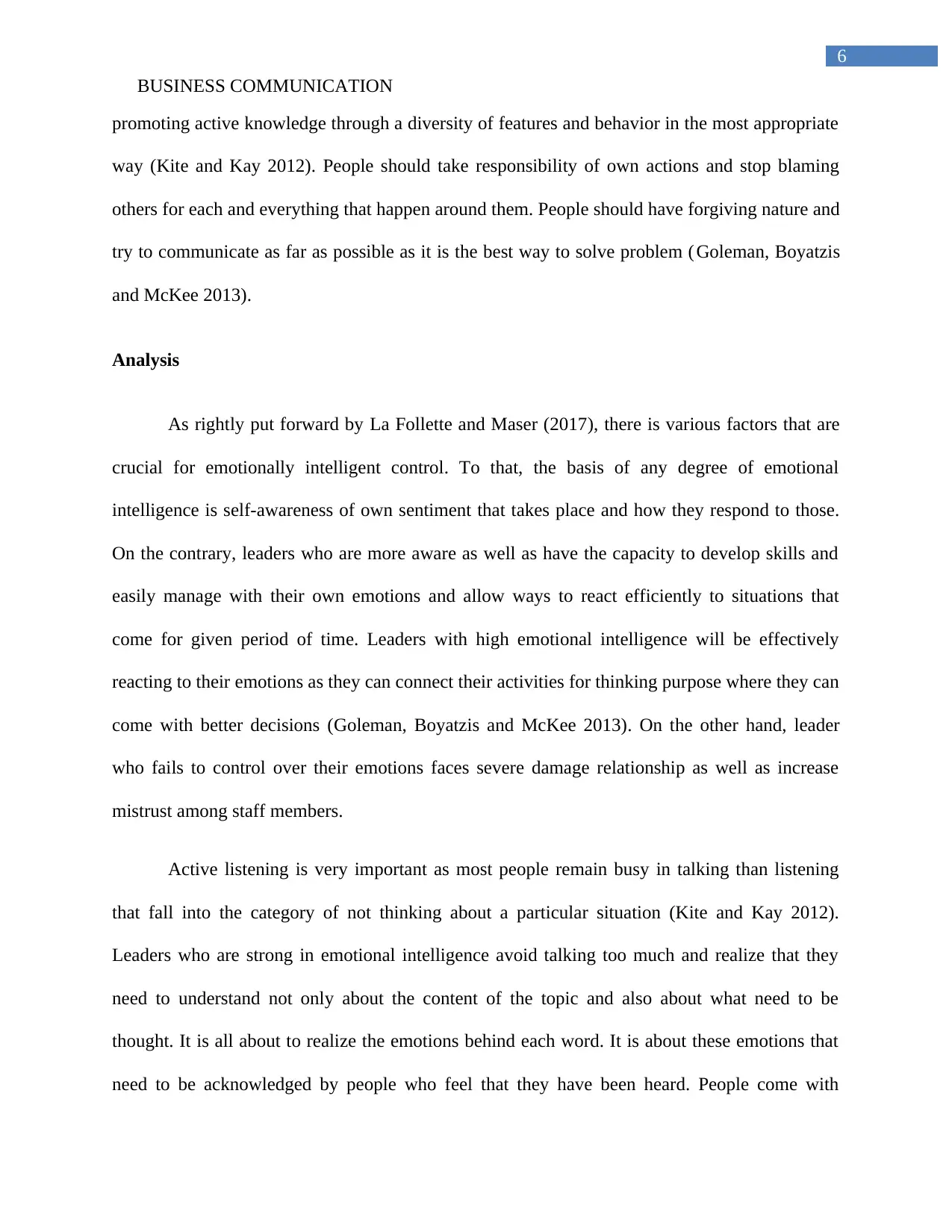
6
BUSINESS COMMUNICATION
promoting active knowledge through a diversity of features and behavior in the most appropriate
way (Kite and Kay 2012). People should take responsibility of own actions and stop blaming
others for each and everything that happen around them. People should have forgiving nature and
try to communicate as far as possible as it is the best way to solve problem (Goleman, Boyatzis
and McKee 2013).
Analysis
As rightly put forward by La Follette and Maser (2017), there is various factors that are
crucial for emotionally intelligent control. To that, the basis of any degree of emotional
intelligence is self-awareness of own sentiment that takes place and how they respond to those.
On the contrary, leaders who are more aware as well as have the capacity to develop skills and
easily manage with their own emotions and allow ways to react efficiently to situations that
come for given period of time. Leaders with high emotional intelligence will be effectively
reacting to their emotions as they can connect their activities for thinking purpose where they can
come with better decisions (Goleman, Boyatzis and McKee 2013). On the other hand, leader
who fails to control over their emotions faces severe damage relationship as well as increase
mistrust among staff members.
Active listening is very important as most people remain busy in talking than listening
that fall into the category of not thinking about a particular situation (Kite and Kay 2012).
Leaders who are strong in emotional intelligence avoid talking too much and realize that they
need to understand not only about the content of the topic and also about what need to be
thought. It is all about to realize the emotions behind each word. It is about these emotions that
need to be acknowledged by people who feel that they have been heard. People come with
BUSINESS COMMUNICATION
promoting active knowledge through a diversity of features and behavior in the most appropriate
way (Kite and Kay 2012). People should take responsibility of own actions and stop blaming
others for each and everything that happen around them. People should have forgiving nature and
try to communicate as far as possible as it is the best way to solve problem (Goleman, Boyatzis
and McKee 2013).
Analysis
As rightly put forward by La Follette and Maser (2017), there is various factors that are
crucial for emotionally intelligent control. To that, the basis of any degree of emotional
intelligence is self-awareness of own sentiment that takes place and how they respond to those.
On the contrary, leaders who are more aware as well as have the capacity to develop skills and
easily manage with their own emotions and allow ways to react efficiently to situations that
come for given period of time. Leaders with high emotional intelligence will be effectively
reacting to their emotions as they can connect their activities for thinking purpose where they can
come with better decisions (Goleman, Boyatzis and McKee 2013). On the other hand, leader
who fails to control over their emotions faces severe damage relationship as well as increase
mistrust among staff members.
Active listening is very important as most people remain busy in talking than listening
that fall into the category of not thinking about a particular situation (Kite and Kay 2012).
Leaders who are strong in emotional intelligence avoid talking too much and realize that they
need to understand not only about the content of the topic and also about what need to be
thought. It is all about to realize the emotions behind each word. It is about these emotions that
need to be acknowledged by people who feel that they have been heard. People come with
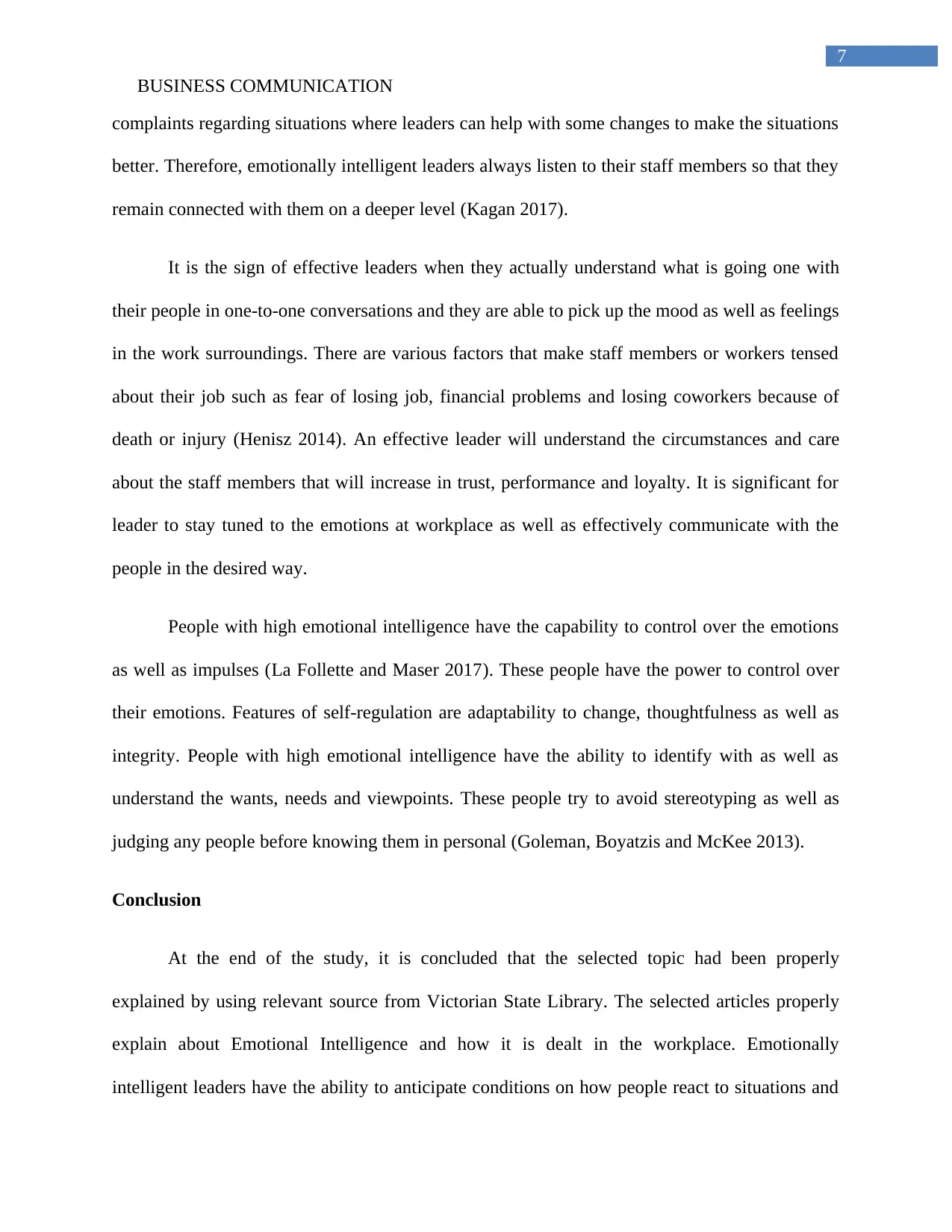
7
BUSINESS COMMUNICATION
complaints regarding situations where leaders can help with some changes to make the situations
better. Therefore, emotionally intelligent leaders always listen to their staff members so that they
remain connected with them on a deeper level (Kagan 2017).
It is the sign of effective leaders when they actually understand what is going one with
their people in one-to-one conversations and they are able to pick up the mood as well as feelings
in the work surroundings. There are various factors that make staff members or workers tensed
about their job such as fear of losing job, financial problems and losing coworkers because of
death or injury (Henisz 2014). An effective leader will understand the circumstances and care
about the staff members that will increase in trust, performance and loyalty. It is significant for
leader to stay tuned to the emotions at workplace as well as effectively communicate with the
people in the desired way.
People with high emotional intelligence have the capability to control over the emotions
as well as impulses (La Follette and Maser 2017). These people have the power to control over
their emotions. Features of self-regulation are adaptability to change, thoughtfulness as well as
integrity. People with high emotional intelligence have the ability to identify with as well as
understand the wants, needs and viewpoints. These people try to avoid stereotyping as well as
judging any people before knowing them in personal (Goleman, Boyatzis and McKee 2013).
Conclusion
At the end of the study, it is concluded that the selected topic had been properly
explained by using relevant source from Victorian State Library. The selected articles properly
explain about Emotional Intelligence and how it is dealt in the workplace. Emotionally
intelligent leaders have the ability to anticipate conditions on how people react to situations and
BUSINESS COMMUNICATION
complaints regarding situations where leaders can help with some changes to make the situations
better. Therefore, emotionally intelligent leaders always listen to their staff members so that they
remain connected with them on a deeper level (Kagan 2017).
It is the sign of effective leaders when they actually understand what is going one with
their people in one-to-one conversations and they are able to pick up the mood as well as feelings
in the work surroundings. There are various factors that make staff members or workers tensed
about their job such as fear of losing job, financial problems and losing coworkers because of
death or injury (Henisz 2014). An effective leader will understand the circumstances and care
about the staff members that will increase in trust, performance and loyalty. It is significant for
leader to stay tuned to the emotions at workplace as well as effectively communicate with the
people in the desired way.
People with high emotional intelligence have the capability to control over the emotions
as well as impulses (La Follette and Maser 2017). These people have the power to control over
their emotions. Features of self-regulation are adaptability to change, thoughtfulness as well as
integrity. People with high emotional intelligence have the ability to identify with as well as
understand the wants, needs and viewpoints. These people try to avoid stereotyping as well as
judging any people before knowing them in personal (Goleman, Boyatzis and McKee 2013).
Conclusion
At the end of the study, it is concluded that the selected topic had been properly
explained by using relevant source from Victorian State Library. The selected articles properly
explain about Emotional Intelligence and how it is dealt in the workplace. Emotionally
intelligent leaders have the ability to anticipate conditions on how people react to situations and
Paraphrase This Document
Need a fresh take? Get an instant paraphrase of this document with our AI Paraphraser
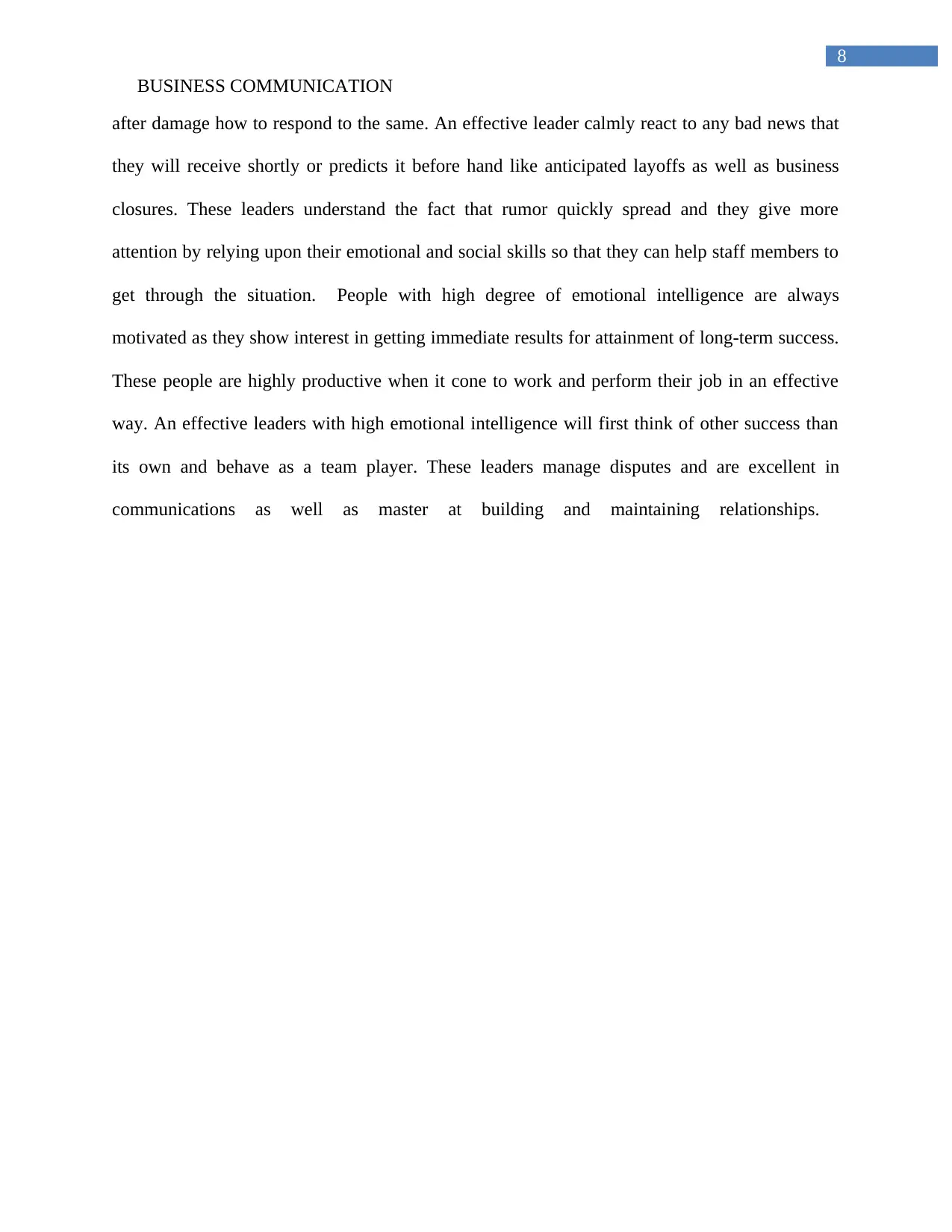
8
BUSINESS COMMUNICATION
after damage how to respond to the same. An effective leader calmly react to any bad news that
they will receive shortly or predicts it before hand like anticipated layoffs as well as business
closures. These leaders understand the fact that rumor quickly spread and they give more
attention by relying upon their emotional and social skills so that they can help staff members to
get through the situation. People with high degree of emotional intelligence are always
motivated as they show interest in getting immediate results for attainment of long-term success.
These people are highly productive when it cone to work and perform their job in an effective
way. An effective leaders with high emotional intelligence will first think of other success than
its own and behave as a team player. These leaders manage disputes and are excellent in
communications as well as master at building and maintaining relationships.
BUSINESS COMMUNICATION
after damage how to respond to the same. An effective leader calmly react to any bad news that
they will receive shortly or predicts it before hand like anticipated layoffs as well as business
closures. These leaders understand the fact that rumor quickly spread and they give more
attention by relying upon their emotional and social skills so that they can help staff members to
get through the situation. People with high degree of emotional intelligence are always
motivated as they show interest in getting immediate results for attainment of long-term success.
These people are highly productive when it cone to work and perform their job in an effective
way. An effective leaders with high emotional intelligence will first think of other success than
its own and behave as a team player. These leaders manage disputes and are excellent in
communications as well as master at building and maintaining relationships.
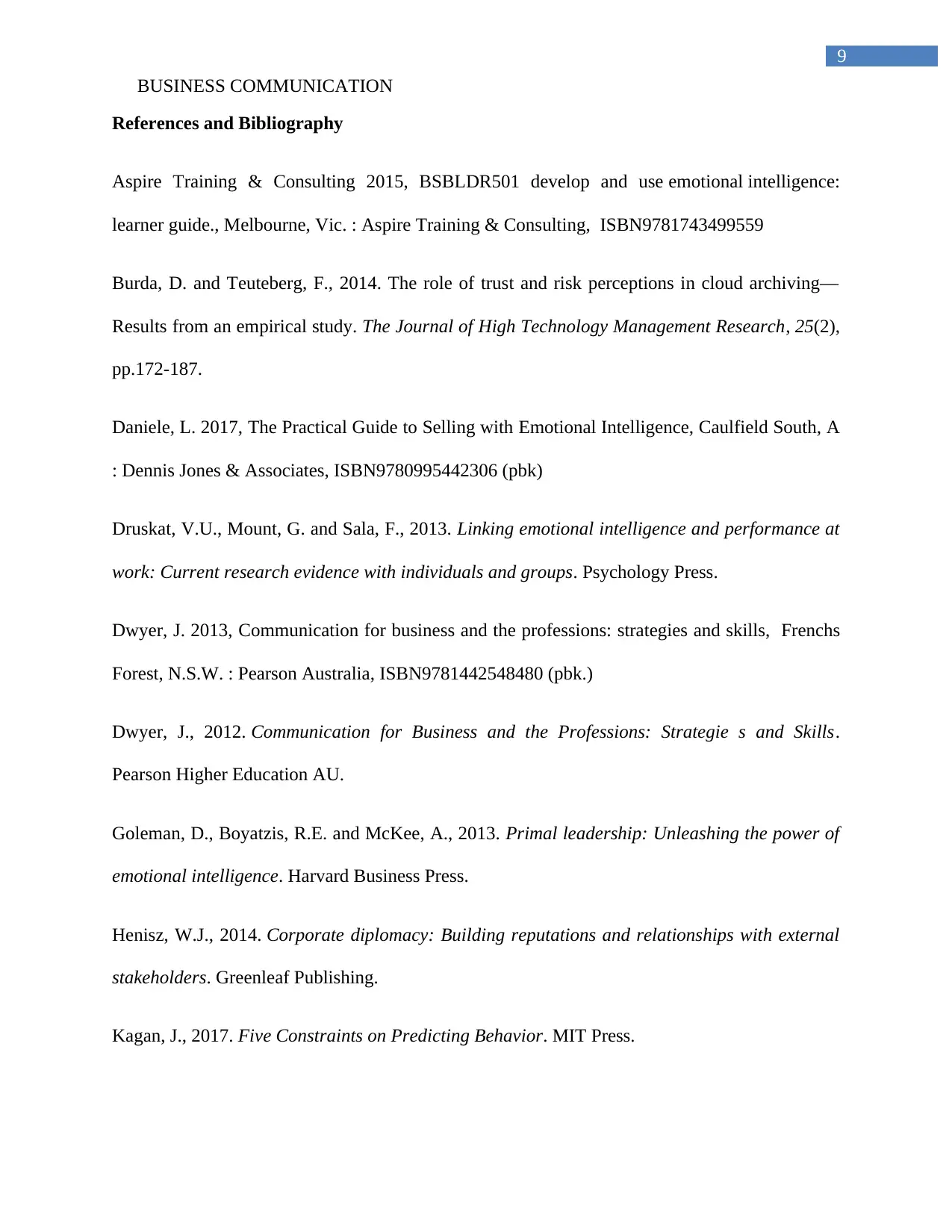
9
BUSINESS COMMUNICATION
References and Bibliography
Aspire Training & Consulting 2015, BSBLDR501 develop and use emotional intelligence:
learner guide., Melbourne, Vic. : Aspire Training & Consulting, ISBN9781743499559
Burda, D. and Teuteberg, F., 2014. The role of trust and risk perceptions in cloud archiving—
Results from an empirical study. The Journal of High Technology Management Research, 25(2),
pp.172-187.
Daniele, L. 2017, The Practical Guide to Selling with Emotional Intelligence, Caulfield South, A
: Dennis Jones & Associates, ISBN9780995442306 (pbk)
Druskat, V.U., Mount, G. and Sala, F., 2013. Linking emotional intelligence and performance at
work: Current research evidence with individuals and groups. Psychology Press.
Dwyer, J. 2013, Communication for business and the professions: strategies and skills, Frenchs
Forest, N.S.W. : Pearson Australia, ISBN9781442548480 (pbk.)
Dwyer, J., 2012. Communication for Business and the Professions: Strategie s and Skills.
Pearson Higher Education AU.
Goleman, D., Boyatzis, R.E. and McKee, A., 2013. Primal leadership: Unleashing the power of
emotional intelligence. Harvard Business Press.
Henisz, W.J., 2014. Corporate diplomacy: Building reputations and relationships with external
stakeholders. Greenleaf Publishing.
Kagan, J., 2017. Five Constraints on Predicting Behavior. MIT Press.
BUSINESS COMMUNICATION
References and Bibliography
Aspire Training & Consulting 2015, BSBLDR501 develop and use emotional intelligence:
learner guide., Melbourne, Vic. : Aspire Training & Consulting, ISBN9781743499559
Burda, D. and Teuteberg, F., 2014. The role of trust and risk perceptions in cloud archiving—
Results from an empirical study. The Journal of High Technology Management Research, 25(2),
pp.172-187.
Daniele, L. 2017, The Practical Guide to Selling with Emotional Intelligence, Caulfield South, A
: Dennis Jones & Associates, ISBN9780995442306 (pbk)
Druskat, V.U., Mount, G. and Sala, F., 2013. Linking emotional intelligence and performance at
work: Current research evidence with individuals and groups. Psychology Press.
Dwyer, J. 2013, Communication for business and the professions: strategies and skills, Frenchs
Forest, N.S.W. : Pearson Australia, ISBN9781442548480 (pbk.)
Dwyer, J., 2012. Communication for Business and the Professions: Strategie s and Skills.
Pearson Higher Education AU.
Goleman, D., Boyatzis, R.E. and McKee, A., 2013. Primal leadership: Unleashing the power of
emotional intelligence. Harvard Business Press.
Henisz, W.J., 2014. Corporate diplomacy: Building reputations and relationships with external
stakeholders. Greenleaf Publishing.
Kagan, J., 2017. Five Constraints on Predicting Behavior. MIT Press.
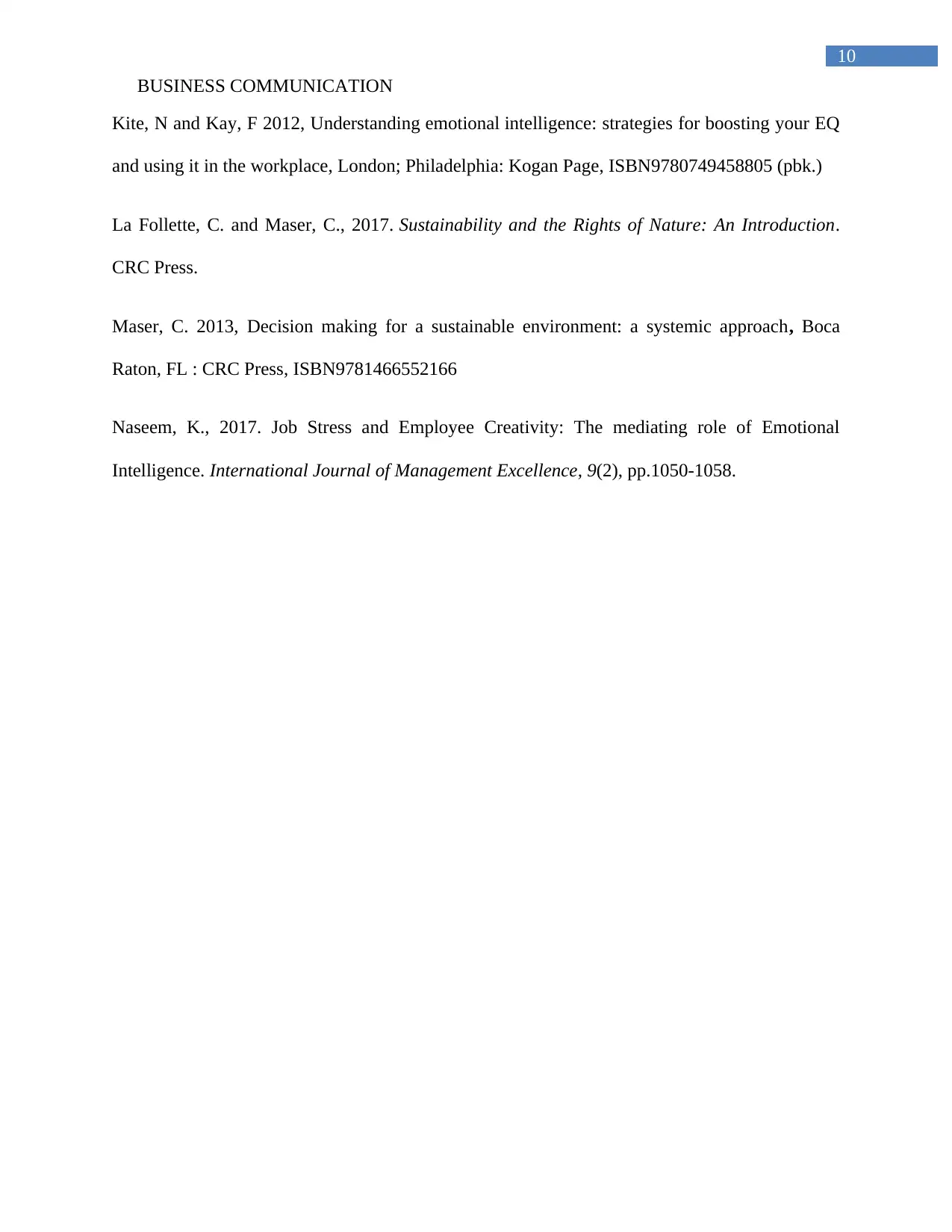
10
BUSINESS COMMUNICATION
Kite, N and Kay, F 2012, Understanding emotional intelligence: strategies for boosting your EQ
and using it in the workplace, London; Philadelphia: Kogan Page, ISBN9780749458805 (pbk.)
La Follette, C. and Maser, C., 2017. Sustainability and the Rights of Nature: An Introduction.
CRC Press.
Maser, C. 2013, Decision making for a sustainable environment: a systemic approach, Boca
Raton, FL : CRC Press, ISBN9781466552166
Naseem, K., 2017. Job Stress and Employee Creativity: The mediating role of Emotional
Intelligence. International Journal of Management Excellence, 9(2), pp.1050-1058.
BUSINESS COMMUNICATION
Kite, N and Kay, F 2012, Understanding emotional intelligence: strategies for boosting your EQ
and using it in the workplace, London; Philadelphia: Kogan Page, ISBN9780749458805 (pbk.)
La Follette, C. and Maser, C., 2017. Sustainability and the Rights of Nature: An Introduction.
CRC Press.
Maser, C. 2013, Decision making for a sustainable environment: a systemic approach, Boca
Raton, FL : CRC Press, ISBN9781466552166
Naseem, K., 2017. Job Stress and Employee Creativity: The mediating role of Emotional
Intelligence. International Journal of Management Excellence, 9(2), pp.1050-1058.
1 out of 10
Your All-in-One AI-Powered Toolkit for Academic Success.
+13062052269
info@desklib.com
Available 24*7 on WhatsApp / Email
![[object Object]](/_next/static/media/star-bottom.7253800d.svg)
Unlock your academic potential
© 2024 | Zucol Services PVT LTD | All rights reserved.